- Home
- Eoin Colfer
Novel - Airman Page 11
Novel - Airman Read online
Page 11
“Telescopic,” said Conor, thinking that if Billtoe could not even pronounce the word, it was unlikely that he had invented a telescopic tool. More likely he had stolen the idea from an inmate.
“Exactly, telescopic. On the tip of me tongue it was.” Billtoe slipped the fork from its holder and twisted a few rings, extending the tool from eight inches to three feet. “Now yer can wriggle this little beauty into cracks and spear any stones what has fallen down there. Amazing, eh?”
Conor knew enough to nod, though an extendable fork was hardly amazing in anyone’s book. It was practical, though, and canny, and proved that Bonvilain knew a good idea when he saw one.
“So all you have to do, Salt, is swim down there into the bell and dig out as many diamonds as you can until your swing is over. Stash them in your net and bring them back up. Simple as bread pudding. Naturally, we search all the divers; and if we find any stones outside of that net, then I find the biggest bull of a guard on the island and have him flog the thievery out of you. Straight enough for you, little soldier?”
Conor nodded, wondering how close the Pipe was to open sea.
Once more, Billtoe displayed a disturbing ability to anticipate Conor’s very thoughts. “Of course, you may decide to swim for it. The lure of freedom may be too strong for you. Feel free to give it your best. You may even make it—mind you, you’d be the first, and bigger men than you have tried. We still get bodies washing up in the cave, decades after they went in. And do you know something? They all look the same way. Dead.”
Conor cinched the belt around his waist, drawing it tight to the last hole. He could figure no escape from this task. In Greek mythology when the heroes were faced with daunting trials, they went about them with stoic determination and emerged victorious. Conor could not muster an ounce of determination for this trial; all he felt was a weight of exhaustion. And even if he did emerge victorious, his only reward would be more of the same tomorrow, and the day after that.
Billtoe encouraged him with a friendly wink and a jaunty tapping of his fingers upon the pistol stock at his waist. Conor set foot in the water, and the cold gripped him in its icy fist, squeezing the life from his toes. An involuntary gasp escaped his lips, causing much laughter from the assembled men.
Conor took a moment to become used to the water temperature, casting a quick eye around the cave, wondering if there were a single person who would come to his aid. Every gaze he crossed was hostile. These were rugged men in evil surroundings, with little time to waste on sympathy. Conor realized that were it not for their uniforms, it would be impossible to separate the guards from the inmates. He was alone in this endeavor. Fourteen, and alone. This was one of the few occasions in Conor’s life when his father was not there to provide guidance. And if Declan Broekhart had been there, perhaps he would have laughed along with the rest of them. It was an unbearable thought.
Though he was without doubt alone, there was something in Conor Broekhart that would not allow him to give in. His mother’s brain and his father’s spirit were strong in his heart. He would endure somehow, and survive. If Conor could return to his cell still breathing, then the American, Linus Wynter, could teach him a lesson or two about Little Saltee.
Push it all from your mind, he told himself. Forget your family, the king, Isabella. Forget them all. Just live to think on them another day. This was easier conceived than achieved, but Conor did the best he could, concentrating on the scene before him, shutting away his torment. He stepped off the rocky ledge, sinking fast into the cold, dark waters of Little Saltee.
For a moment the cold was absolute and it seemed as though nothing could ever be any colder. Conor thrashed his limbs, not from fear but to generate some heat. He had often swum on the Saltee beaches, but the water he was in now had never been blessed with sun. There was nothing to raise the temperature a few degrees.
Conor opened his eyes, peering through the liquid gloom. Below him, he spied a blob of orange, like a fading sun in the grip of black space. The bell.
It is not so far down, he told himself. A chap would have to be a pretty poor swimmer not to make that distance. Ten kicks at most. Conor duck dived, cupping his hands to better scoop the water. He had always been a good swimmer, and immediately the orange blob assumed its proper bell shape and he could make out the texture of its surface. This tiny success comforted him somewhat. I am not helpless. I can still do things.
The bell swung gently two feet above the cave bed; air bubbles leaked like pearl strings from a dozen tiny breaches. Conor hooked his fingers under its curved rim and wriggled inside. His efforts were rewarded by air, not by any means sweet or fresh, but air, nonetheless. Conor filled his lungs to capacity, ignoring the rubbery smell and the oily film that instantly coated his nose and throat.
The bell was suspended two feet above the floor of the cave, and the surface below Conor’s feet was uneven, slick, and treacherous. This was not an ideal working environment. The bell itself had a diameter of barely ten feet, and swung in irregular arcs with the current, butting Conor in the shoulder and elbow. He hunched his shoulders as far as possible, protecting his head. The light was murky and wavering.
Conor peered upward but could make out nothing more distinct than vague wavering silhouettes. Perhaps men? Perhaps rocks? It was impossible to tell. But then one of the silhouettes detached itself from the group.
Conor watched with a dread colder than seawater as the figure leaped into the ocean, shattering its surface into a jigsaw of silver crescents. The sound of the splash carried through the bell’s air hole. Another sound carried too; laughter wafting through the pipe like ghost mirth. Dark, vicious, threatening laughter.
Conor choked down absolute terror. Survive. You can do things. Survive.
Then something flashed past the porthole. A pale limb. Thick and muscled, swatting at the water. And on the forearm, drawn with bold punctures, visible even through a sheen of scum, a tattoo of a horned ram.
A sheep, thought Conor. Sheep are not for stewing here on Little Saltee.
The figure disappeared from the porthole, pulling itself down the bell curve. Hands slapped at the brass, setting off a cacophony of shuddering clangs inside the bell’s skirt. The clangs reverberated around the diving bell until Conor prayed for silence. Surely his ears were bleeding. Then four thick fingers curled under the bell’s rim, shimmering white in the water.
Each finger was tattooed with a single letter. Even upside down, it didn’t take a scholar to read what the letters promised. P.A.I.N.
Conor didn’t doubt it for a second.
A huge man dragged himself along the seabed, mindless of the sharp rocks scraping his flesh. When he stood inside the bell, a dozen red rivulets ran down his torso. It suddenly seemed to Conor that there was not enough air left to breathe. He backed away until the diving bell’s cold metal molded the curve of his spine.
The man’s size was doubtless exaggerated by the confined space, but he still seemed a giant to Conor. He spread his arms wide, tinkling his fingers on the brass bell as though it were a grand piano. The sweet sound was hardly appropriate for the situation. Whatever this man intended to do, he seemed to be in no hurry to complete his mission. He stretched this way and that, cracking neck and knuckles, all the while wearing an expression of serene contentment. Conor read many things into that half smile. A confidence in his brutish abilities, memories of past violence—and the anticipation of the job at hand.
The man smiled, a yellow tobacco grimace, but then his expression drooped as he realized Conor’s age. “Hell’s bells, you’re nothing but a boy. What did you do? Lie about your age to get a ticket for the army? Are you that desperate to patrol a wall? There ain’t even a war on.”
“You’re a sheep,” said Conor numbly. “‘Sheep are not for stewing here on Little Saltee.’”
The man stroked his tattoo fondly. “There are those that call us sheep, but our name proper is the Battering Rams. That being our favorite method of doing the big
job.”
Conor understood the sheep references now. The Battering Rams were a notorious gang of London Irish who were involved in smuggling in ports from London to Boston and whose other main source of income was from hiring out thugs. It would seem that this particular ram had been gainfully employed.
“Ah well,” continued the man. “I’ve been paid now, and I don’t like to disappoint my employers, so you’ll have to take your licks, boy or not.”
“Are you going to kill me?” asked Conor. The man’s odor filled the bell, clogging the confined space with sweat, blood, tobacco, and stale breath.
The man rolled open his shirt, revealing a list tattooed on his chest. “I could kill you, and my employer would still be in credit, because he paid me three pounds.”
Conor read the words on the man’s pale flesh:
Punching—2 shillings
Both eyes blacked—4 shillings
Nose and jaw broke—10 shillings
Jacked out (knocked out with a black jack)—15 shillings
Ear chawed off—same as previous
Leg or arm broke—19 shillings
Shot in leg—25 shillings
Stab—Same as previous
Doing the Big Job—3 pounds and up
The man buttoned his shirt. “He paid me the full three pounds, but said I was to spread it out. Keep punching on a daily basis until he was out of credit. That’s a fair whack of punching, but you being such a slip of a whelp, I reckon one belt a day should do it. Maybe, if the task is becoming tiresome after a few weeks, I may chew your ear off just to finish it.”
Conor was finding it difficult to believe what he was hearing. The man had such a professional manner, as though he were a roofer quoting for a slate job. “What will you do if your prices go up?”
The man frowned. “You mean the tattoo? I never thought of that. I suppose I’ll have to have it writ over. There’s a little Galway geezer what is good with the needles. Anyway, see yer tomorrow . . .”
“What?” said Conor, but before his teeth had closed over the final consonant, the man’s huge fist had already begun its arc, swinging toward Conor’s head like a cannonball. The last things Conor saw were the letters P.A.I.N., but he remained conscious long enough to hear the Battering Ram sing this savage ditty.
“We stabs ’em,
We fights ’em,
Cripples ’em,
Bites ’em.
No rules for our mayhem.
You pay us, we slays ’em.
If you’re in a corner,
With welshers or scams.
Pay us a visit,
The Battering Rams.”
And then the whole world was wet and Conor gladly allowed himself to be tugged away by the currents. Maybe this time I won’t wake up, he thought. I need never wake up again.
But wake up he did, many hours later, with Linus Wynter bending over him, green paste dripping from his fingers. “More plantago I fear,” he explained. “This is becoming a habit.”
Conor closed his eyes again, fearful that he would cry. He kept himself still for long minutes, breathing quiet breaths through his nose. He could feel the cold muck on his temple where the giant had struck him, and more on his hand where the brand still scalded. There must be an end to this. How long could a mind endure such torture and stay whole?
“You have been asleep for nearly twelve hours. I saved your rations for you. Have some water, at least.”
Water. The very word had the power to awaken Conor fully. His throat felt flaked with thirst. Man’s primary instinct is to survive, Victor had once told him. And he will endure almost anything to follow his instincts.
“Water,” croaked the boy, raising his head until the plantago juice ran down his forehead. Wynter held a rough earthenware cup to Conor’s lips, dribbling water down his throat. To Conor, the drink tasted like life itself, and soon he felt strong enough to hold the cup. He sat slowly, sighing gratefully for the simple pleasure of slaking his thirst.
“And now you should eat,” said Wynter. “Keep your body strong. A fever in here could kill you.”
Conor laughed, a feeble shuddering. As though fever would ever have the chance to kill him. The Battering Ram had almost three pounds’ worth of beatings to dole out, and it was hardly likely that Conor could survive those.
Wynter pressed a shallow bowl into Conor’s hand. “Whatever happened to you, and whatever is going to happen, you will not have a prayer without strength in your limbs.”
Conor relented, picking a chunk of cold meat from the bowl of stew. He doubted that the meal, even when hot, could ever have been called appetizing. The meat was tough, with a wide band of fat and hard burned ridges along each side. But meat was strength, and strength was what he would need to go back in the bell with a mad sheep.
“Now,” said Wynter. “Tell me what happened today. They brought you back here on a plank. For a moment I couldn’t even find a heartbeat.”
Conor chewed on a lump of meat. The fat was slick and rubbery between his teeth. “They put me in a diving bell with one of those Battering Rams.”
“Describe him,” instructed Wynter.
“Big man. Enormous. Tattoos all over. P.A.I.N. on his knuckles and—”
“A price list on his chest,” completed Conor’s cellmate. “That’s Otto Malarkey. The top ram. That animal has beaten more men than he can count. And he can count well enough, especially when there’s coin involved.”
“He’s been paid coin aplenty to keep handing out daily beatings. This is how they will break me.”
“A simple but effective plan,” admitted Wynter. “Set the big man beating the little man. That tactic worked on everyone, even Napoleon.”
Conor took a drink of water. Now that his senses were returning, he could taste the saltpeter in it. “There must be something I can do.”
Wynter thought on it, fixing the bandage across his eyes with long pianist’s fingers.
“This problem is more important than all the daily vexations I had planned to educate you on this evening. Malarkey must be dealt with if you are to survive, young Conor.”
“Yes, but how?”
“You need to rest. Lie flat and think on your strengths. Draw on everything you have ever been taught. Tease out every violent daydream you have ever nursed in your darkest hours. You must have talents; you are a tall boy and strong.”
“And if I do have talents, what then?” insisted Conor.
“Another simple plan,” whispered Wynter. “Older even than the first. When you see Malarkey next, you must immediately kill him.”
Kill him. “I can’t. I could never . . .”
Wynter smiled kindly. “You are a good lad, Conor. Kind. Killing is hateful to you, and the thought that you could ever take a life is a terrible one.”
“Yes. I am not the kind of . . .”
Wynter raised a conductor’s finger. “We are all that kind of person. Survival is the most basic instinct. But you are sensitive, I can tell, so I will help you along the road to murder. Since my eyes were taken from me, I have become adept at re-creating images in my head. I can see the concert halls of my youth. Time and concentration fill the spaces until the picture is complete. Every velvet-covered chair, every footlight, every gilded cherub.” For a long moment, Wynter was lost in his own colorful past; then the sounds and smells of Little Saltee shattered his mental image. “What I need you to do is close your eyes and picture the man who sent you here, and use your hatred of him to awaken the killer instinct.”
Conor did not need to concentrate for long. Bonvilain’s face sprang into his mind, complete with hateful eyes and derisory sneer.
“And now, Conor, tell me, do you think you can kill?”
Conor considered everything Bonvilain had done to the Broekhart family. “Yes,” he said. “I can kill.”
Linus Wynter smiled sadly. “We all can,” he said. “God save our souls.”
CHAPTER 7: THE DEVIL’S FORK
In the doo
r opposite Conor Broekhart’s bunk there was a small rectangular window. Perhaps three times in every hour a guard passed by, bearing a torch. Flickering orange light poured into the gloom of their cell, casting a vague dancing flame on Conor’s hand when he raised it to examine his Saltee kiss. There, already crusted in scab, a cursive S. He was branded now, forever a criminal.
A kind of peace had descended on Conor. Events were simply so monumental that he could not deal with them, and that brought a kind of freedom. There was nothing to do but concentrate on Otto Malarkey, the deadly Battering Ram who so cheerfully swatted his prey around the diving bell. Must he be killed? Was there no other way?
There was not, he concluded. Sadly, it was either Otto Malarkey or himself. And though Conor had never been puffed by self-importance, he sincerely believed that he had more to offer the human race than the murderous Malarkey. At the very least, he would try to avoid killing any more of his fellow men.
But how to kill Malarkey? How? What skills had he learned from Victor? The foil, of course, had always been his greatest success. He had the strength of a fencing master in his wrists, and the agility of a youth in his limbs. But how to combine the two? I don’t even have a foil, or anything like one.
But then Conor remembered the tool belt that had been cinched about his waist. Perhaps that was not strictly true. Perhaps Arthur Billtoe had unwittingly come to his rescue.
The following day’s routine was the same as the previous one’s. Shortly after the single cannon-shot salute, Billtoe appeared at the cell door, a fresh slab of grease taming his curly locks. That morning he appeared to have shaved sections of his face, leaving the rest sprouting black, silver, and ginger bristle.
“Ready for round two with Malarkey?” he asked, rifle held before him in case Conor should prove resistant to the idea of being hammered around a diving bell by a Battering Ram.

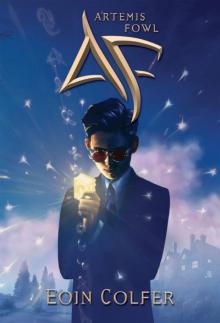 Artemis Fowl
Artemis Fowl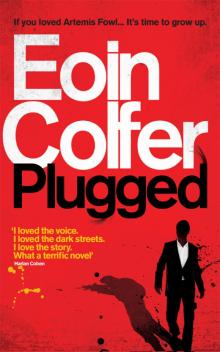 Plugged
Plugged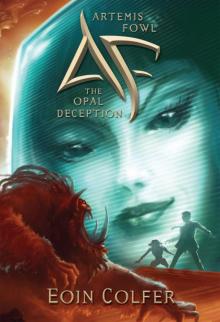 The Opal Deception
The Opal Deception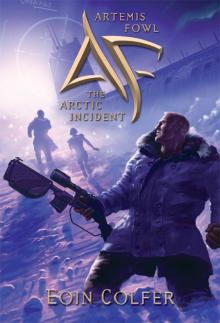 The Arctic Incident
The Arctic Incident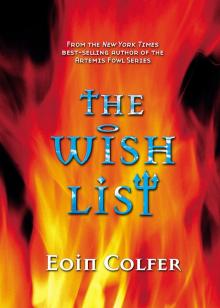 The Wish List
The Wish List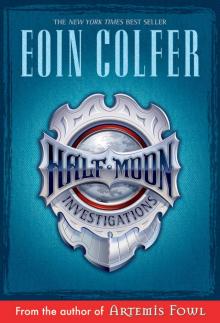 Novel - Half Moon Investigations
Novel - Half Moon Investigations The Supernaturalist
The Supernaturalist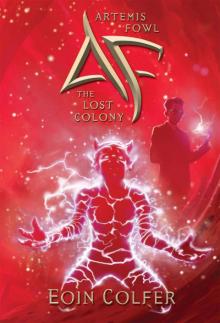 The Lost Colony
The Lost Colony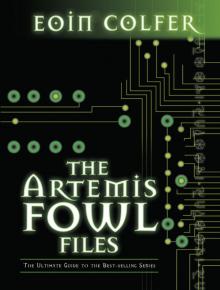 The Artemis Fowl Files
The Artemis Fowl Files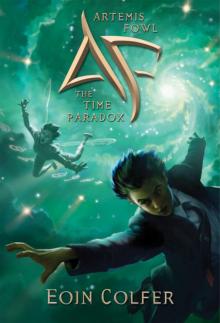 The Time Paradox
The Time Paradox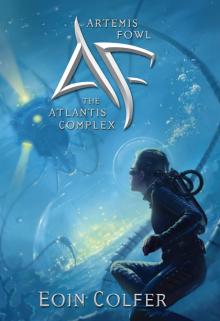 The Atlantis Complex
The Atlantis Complex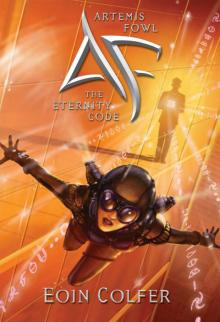 The Eternity Code
The Eternity Code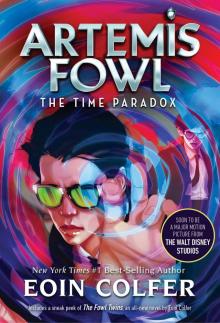 The Time Paradox (Disney)
The Time Paradox (Disney)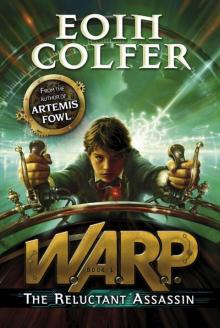 The Reluctant Assassin
The Reluctant Assassin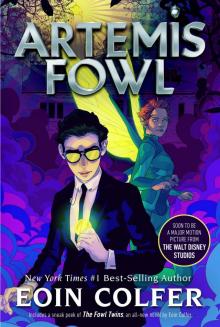 Artemis Fowl (Disney)
Artemis Fowl (Disney)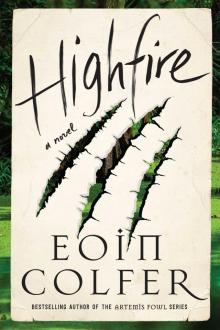 Highfire
Highfire The Last Guardian
The Last Guardian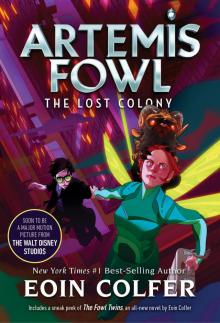 The Lost Colony (Disney)
The Lost Colony (Disney)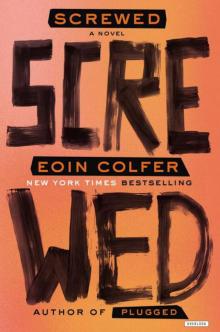 Screwed: A Novel
Screwed: A Novel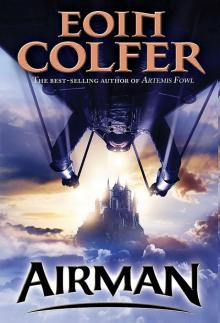 Novel - Airman
Novel - Airman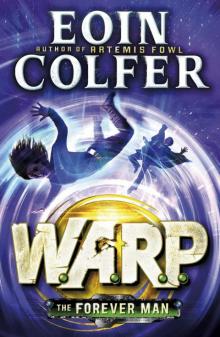 The Forever Man
The Forever Man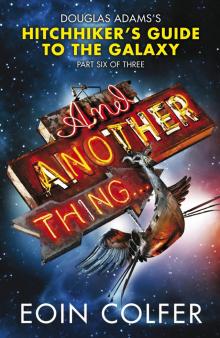 And Another Thing...
And Another Thing...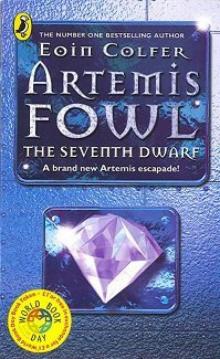 The Seventh Dwarf
The Seventh Dwarf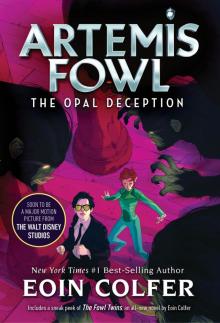 The Opal Deception (Disney)
The Opal Deception (Disney)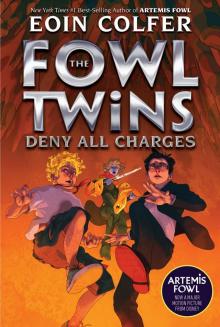 The Fowl Twins Deny All Charges
The Fowl Twins Deny All Charges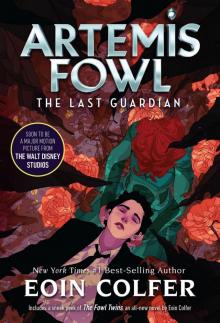 The Last Guardian (Disney)
The Last Guardian (Disney)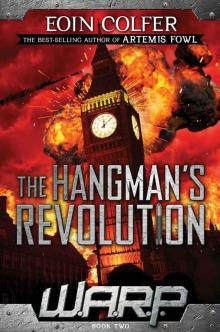 The Hangman's Revolution
The Hangman's Revolution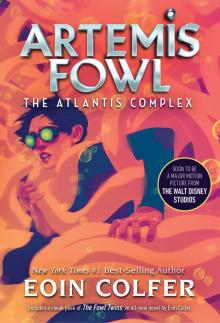 The Atlantis Complex (Disney)
The Atlantis Complex (Disney)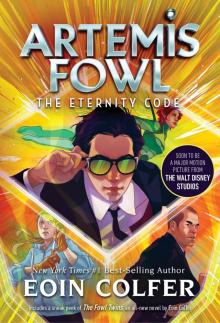 The Eternity Code (Disney)
The Eternity Code (Disney)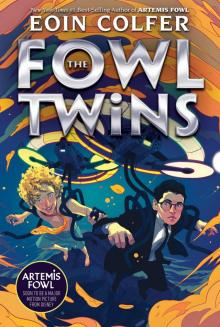 The Fowl Twins
The Fowl Twins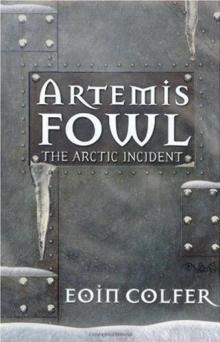 Artemis Fowl. The Arctic Incident af-2
Artemis Fowl. The Arctic Incident af-2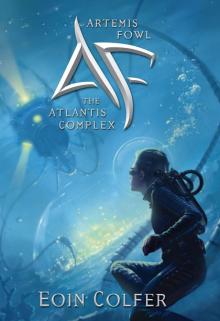 Artemis Fowl and the Atlantis Complex af-7
Artemis Fowl and the Atlantis Complex af-7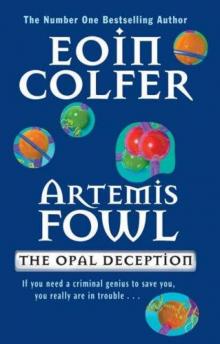 Artemis Fowl. The Opal Deception af-4
Artemis Fowl. The Opal Deception af-4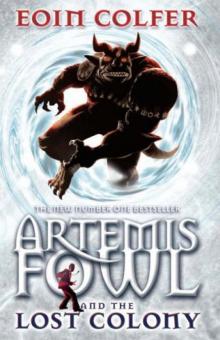 Artemis Fowl. The Lost Colony af-5
Artemis Fowl. The Lost Colony af-5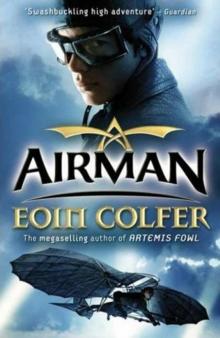 Airman
Airman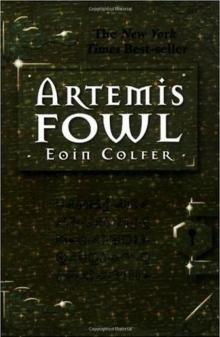 Artemis Fowl af-1
Artemis Fowl af-1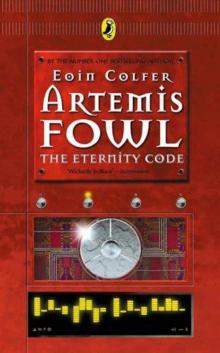 Artemis Fowl: The Eternity Code af-3
Artemis Fowl: The Eternity Code af-3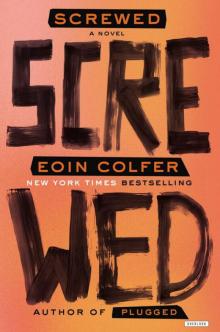 Screwed dm-2
Screwed dm-2